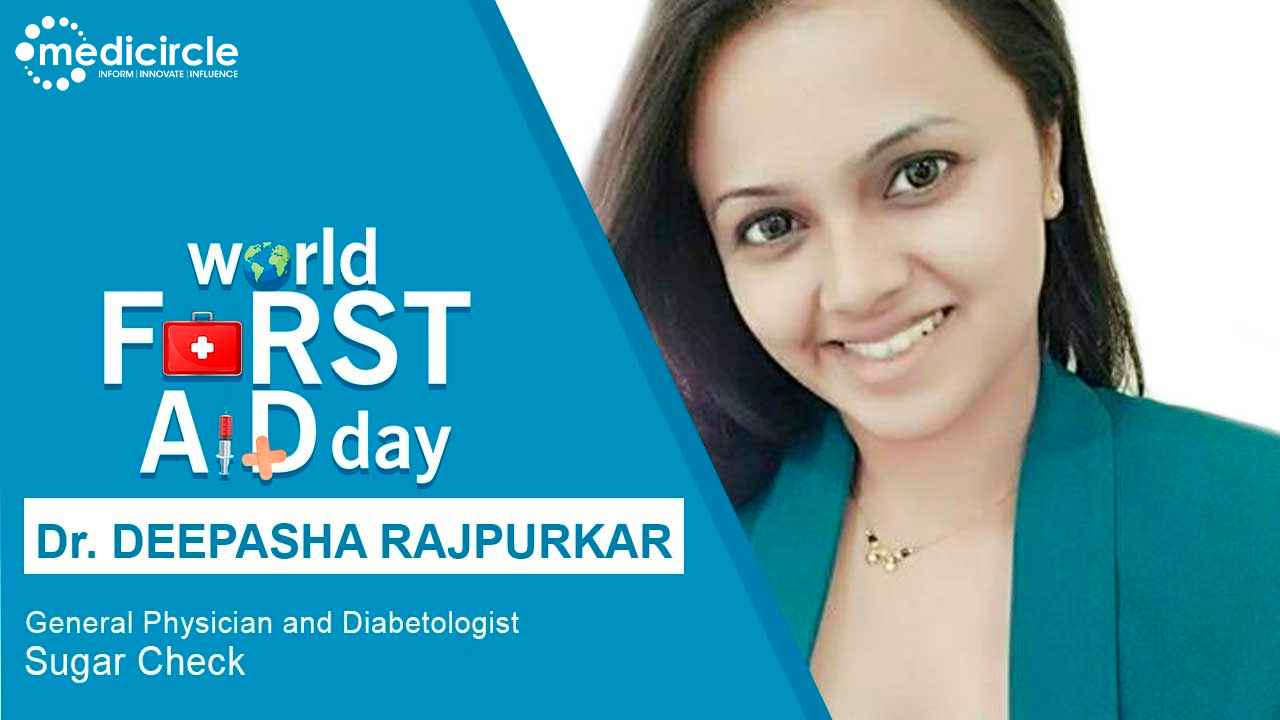First Aid’ means the first primary help that is provided to anyone who is suffering from disease, damage, or an injury. Its primary goal is to protect life and keep the condition from worsening. In an emergency, even ordinary people can help and can save someone’s life by providing first aid. Globally, more than 1.3 million people die in road traffic accidents every year. According to government data, 50 percent of road traffic deaths in India could have been prevented, had the injured received basic trauma care within the first hour after the accident.
The International Federation of Red Cross and Red Crescent Societies (IFRC) had started World First Aid Day in 2000. World First Aid Day is observed on the second Saturday of September annually every year. Its main aim is to spread awareness of how first aid can prevent injuries and save lives every day and in a crisis. We at Medicircle are conducting World First Aid Day Awareness Series to impart basic knowledge and encourage people to take basic training required for first aid to an injured or infected person so that a life is saved.
Dr. Deepasha Rajpurkar is a General Physician and Diabetologist in Mumbai and has an experience of 11 years in these fields. Dr. Deepasha practices at Sugar Check in Thane West, Mumbai. She has expertise in Type 2 Diabetes treatment, Diabetes, Reversal of Diabetes, Management of type 1 and type 2 diabetes, pregnancy-related diabetes management, Insulin pump, pens, glucometer training, diabetic diet, realistic lifestyle modification.
First aid and its importance
Dr. Deepasha says, "First aid is the first response or treatment given to an injured patient to stabilize the patient's condition till the patient reaches the hospital. This is not a complete medical treatment but helps prevent the condition from getting worse.”
Dr. Deepasha adds, “We only realize the importance of first aid when someone near and dear to us needs it. Learning first aid can be of great importance. Knowing about first aid and its practice can save someone’s life.”
Principles of first aid
Dr. Deepasha explains the basic principles of first aid
Preserving life – You can give CPR for someone who has stopped breathing
Protecting the unconscious - This could involve placing an unconscious casualty into the recovery position to keep their airway clear.
Preventing the condition worsening - By controlling bleeding or cooling a burn, the condition will not get worse
Promoting recovery - By raising the legs for someone who has fainted, they can recover quickly.
Basic first aid procedure
Dr. Deepasha describes basic first aid procedure
Checking airway – If someone's not breathing, clear their airway. Checking breathing – If the airway is clear and they're still not breathing, provide rescue breathing. Checking circulation – Along with rescue breathing perform chest compressions. If the person is breathing but unresponsive, check their pulse to see if their heart has stopped and, if so, provide chest compressions. Disability assessment – The first aider or trained person knows the procedure to stop deadly bleeding, or defibrillator if someone's heart has stopped and an automated external defibrillator (AED) device is available. Examination - Evaluating the person for signs of injury, bleeding once they are breathing normally and their heart is beating.
Most common first aid procedures of everyday events
Dr. Deepasha tells some common first aid of everyday events
Cardiac arrest - Cardiopulmonary resuscitation (CPR) is the most important medical procedure for cardiac arrest.
Bleeding – Cover the part with gauze and put pressure. Elevate the body part against gravity to reduce bleeding.
Choking – Heimlich maneuver
Burns – Put the affected part under running water for some time. Do not use ice.
Blisters – Don’t prick them
Fractured or broken bone - Don't try to straighten it. Just give support and some pain killers till the patient reaches the hospital.
Sprains – Apply cold packs and not hot packs.
Nose bleeding – Hold the bridge of the nose tightly and apply a cold pack.
First aid awareness
Dr. Deepasha mentions, “There is a lot of information available online about first aid which you can use.
You should take proper training in first aid. Employers should conduct training sessions for all their employees. The basics of first aid should be taught in schools. There are a lot of organizations that provide classes on the weekends and give certificates also. There is Good Samaritan Law which protects any volunteer giving aid to an injured person in an emergency. So, get trained and help the needy people.
Dr. Deepasha speaks, “Patients with hypoglycemia (low blood sugar) often faint. The basic first aid for this is just stabilizing the patient and giving them some sweets to eat. Do not panic, it is a manageable situation. Patients with hypoglycemia should always keep some kind of chocolates with them.
(Edited by Renu Gupta)

 Dr. Deepasha provides valuable inputs on first aid and its importance. Dr. Deepasha also gave some really important first aid treatment for our everyday events
Dr. Deepasha provides valuable inputs on first aid and its importance. Dr. Deepasha also gave some really important first aid treatment for our everyday events

































